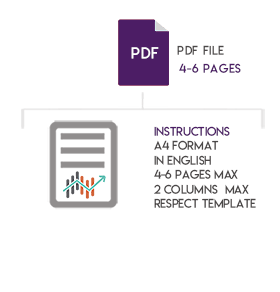|
|
|
Submission instructions > Submission instructions
|
FULL PAPER INSTRUCTIONS
The submission system is open. The first step consists in submitting for review an initial 4-6 pages manuscript.
For all accepted papers, the second step consists in submitting the 4-6 pages full paper taking into account reviewer comments.
Some of you are experiencing difficulties in submitting your full paper on the platform.
We invite you to send us directly your document in pdf format by email to the following address: electrimacs2022@ul-propuls.fr
Your sciencesconf number, the title of the paper and the name and surname of the main author must be indicated in your email.
The name of your file must be "Reference sciences conf - name of the author".
For example "390108 - John Doe.pdf".
Without this information, we will not be able to process your request.
|
SUBMISSION INSTRUCTIONS Please find below some key information such as the topics to submit your initial manuscript as well as information regarding the submission process. To submit your initial paper, respect the following instructions::
Download the LaTeX template here. PUBLICATIONS All the papers presented at the conference will be published either on the traditional MATCOM special issue (appearing as journal papers) or in a Springer book (appearing as book chapters). More information on the Publication information web page.
|
|
|
ELECTRIMACS 2022 TOPICS:
|
|
- Control and power management of electrical systems
- Real time simulation methods
- Modeling and control methods applied to electrical systems
- Hardware in the loop emulation of electrical systems
- Fuel cell systems
- Identification/diagnostic/prognostic techniques applied to electrical systems
- Microgrids/smart grids
- Centralised, decentralised and distributed control of microgrids
- Design and optimisation of microgrids systems
- Optimized Power management of microgrids systems
- Forcasting methods
Please find below the topics to submit your abstracts :
Themes for Technical Tracks
• Technical Track 1 (TT1): Modelling and simulation of power elctronics system
• Technical Track 2 (TT2): Modelling and simulation of electrical machines and electromagnetic device
• Technical Track 3 (TT3): Control and power management of electrical system
• Technical Track 4 (TT4): Microgrids/smart grids
Themes for Special Sessions
• Special Session 1 (SS1): Marine Hybrid Power and Propulsion Systems and Key Enabling Technologies
• Special Session 2 (SS2): Reliability and Safety management of Power Devices and Power Electronics- based Systems
• Special Session 3 (SS3): Advance in Nanogrids Architectures for Smart Buildings and Energy Community
• Special Session 4 (SS4): Energy Storage Systems: advanced modelling, simulation, control and diagnostic techniques
• Special Session 5 (SS5): Design and optimization methods in complex electrical systems
• Special Session 6 (SS6): Advanced control and observation of multi-source/multi-converter systems
• Special Session 7 (SS7): Control strategies and energy management of Fuel Cell Hybrid Vehicles
• Special Session 8 (SS8): Eco Design of Electric energy converters
• Special Session 9 (SS9): Future power electronics for resilient high-power-quality grid-connected renewable energy systems: design, modelling and control
• Special Session 10 (SS10): Machine Learning and Artificial Intelligence for smart grids and power systems
• Special Session 11 (SS11): Power-Electronics Multi Converter Systems: design tools and industrial applications
• Special Session 12 (SS12): Recent Trends in Artificial Intelligence for Power Electronics





